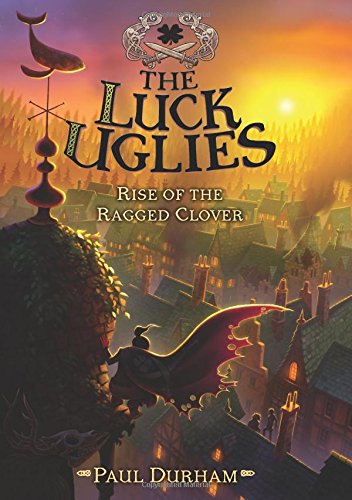 Rise of the Ragged Clover is the third, and I assume final, book in the Luck Uglies series. It’s been a good story from the beginning. Riley (Rye) O’Chanter and her family and friends fight against unnumbered foes, including the corrupt Earl Morningwig Longchance and his family, a multitude of Bog Noblins, the treacherous Fork-Tongue Charmers, and in this new book, Shriek Reavers and a River Wyvern. In an uneasy coalition with the Luck Uglies, outlaws who protect the town of Drowning, sometimes, Rye and her friends try to protect the weak and the innocent, but end up in dangerous and morally ambiguous situations over and over again until the final climax of the story has Rye face an impossible choice: let the Bog Noblins destroy Drowning or drown the town in a flood that might kill everyone anyway.
Rise of the Ragged Clover is the third, and I assume final, book in the Luck Uglies series. It’s been a good story from the beginning. Riley (Rye) O’Chanter and her family and friends fight against unnumbered foes, including the corrupt Earl Morningwig Longchance and his family, a multitude of Bog Noblins, the treacherous Fork-Tongue Charmers, and in this new book, Shriek Reavers and a River Wyvern. In an uneasy coalition with the Luck Uglies, outlaws who protect the town of Drowning, sometimes, Rye and her friends try to protect the weak and the innocent, but end up in dangerous and morally ambiguous situations over and over again until the final climax of the story has Rye face an impossible choice: let the Bog Noblins destroy Drowning or drown the town in a flood that might kill everyone anyway.
I really did like the story, but the moral ambiguity and ends-justify-the-means reasoning was too much for my sensibilities, which have admittedly been scarred by this election season. However, these are some of the nuggets of “wisdom” that Rye’s father drops, and I just couldn’t help applying them to our own national leadership crisis. This kind of advice (moral relativism) has led us to where we are now.
“Sometimes only the bad guys can save you. Sometimes it takes a villain to save you from the monsters.”
I can’t help it. I’m reading: “Sometimes we have to vote for the lesser of two evils. Sometimes only a strong, bad, guy is strong enough to shake things up and save us from a really evil and worse fate.” Consequentialism, blech.
” . . . a leader’s choices are sometimes impossible ones. The right decision may not be the best, and the best decision can be both right and wrong. So a real hero can only follow her heart.”
And what if “her heart” leads her to justify the killing of unwanted babies or what if “his heart” says he must kiss every girl he is attracted to? What if the hero’s heart is desperately wicked and deceptive?
“That magic, your unique abilities, they’re already within each of you. All you needed was something to believe in. And sometimes it’s easier to believe in a charm or a totem than it is to believe in ourselves.”
Again with the believe in yourself/follow your heart Disney-esque advice. And if you find it difficult to believe that you are a god and your heart is always right, make yourself a harmless little idol to convince you of your own omnipotence.
Finally in the end, Rye makes the right decision about her future, but again it’s just based on her feelings. She doesn’t feel like becoming a tough outlaw chieftain in order to bring about good for the town, the Luck Uglies, and her friends:
“I don’t want to use fear as a weapon and struggle for power. I don’t want to be the one to lead the Luck Uglies out of the dark if it means I must first step into the shadows myself.”
But the contorted, murky, and turgid moral reasoning that comes before that fine declaration is not what I needed to read in this contorted, murky, and turgid swamp of a political season. And the story itself is morally ambiguous, wth the bad guys sometimes seemingly not so bad, or least there’s always something badd-er for the villains to fight against and thereby become somewhat redeemable. I needed clear, bright lines between good and evil, lucid and rational ethical thought, and a real hero who trusts in some standard besides her own heart. I tend to believe that we all need those things, especially kids, especially now.
Maybe the timing was wrong for me to read this book. Maybe (probably) I’m loading way too much baggage onto a middle grade fantasy novel. If you enjoyed the first two books in the series, you’ll probably like this one, too. I would suggest that you read the three books in the trilogy in order. There are a lot of characters and creatures to keep straight, and I don’t think jumping into the middle (or the last third) of the story will work well for this one.
My review of the first two book in the Luck Uglies series (in which I was bothered by the moral ambiguity of the novels).
Pingback: Trends and Themes in Middle Grade Speculative Fiction 2016 – Semicolon